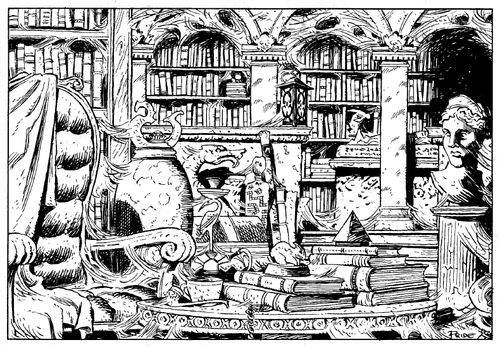|
Cryptozoology: The study of non-standard forms of life. Often members will investigate such rare creatures, called “Cryptids” as 'Bigfoot', 'Mothman' and the 'Loch Ness Monster'. This is one of the more public colleges and members who follow it often come from the fields of Biology, Zoology, Anthropology, and Natural Sciences.
Fae Lore: The study of faeries and all those associated with such legends. Originally a form of Cryptozoology it was later created as its own college to include such creatures that do not possess material physiology such as 'Will-o-the-wisp' and the like. This is one of the more esoteric colleges as finding 'proof' of their studies is often very difficult. However, those who follow this college come from the fields of Literature, Folklore, Cultural Anthropology and History.
Hermetic Sciences: The study of metaphysics such as alchemy, astrology, numerology, geomancy, divine geometry and other topics. Most Hermetic Scientists tackle questions of the modern age with a near-mythic perspective. This college has some of the most extensive records available as much of the work of hermetic scholars still survive from as far back as ancient Egypt and Greece. Those who follow this college come from the fields of Chemistry, Engineering, Anthropology, History, and Physics.
|
Mytho-Archaeology: The study of non-standard cultures through the lens of archeology. Many Mytho-archaeologists research topics ranging from Atlantis, Lemuria, and Shangrilah. Their interests often lead them to investigating cultural relics that defy conventional archaeological wisdom. This is one of the more popular colleges since the rise of popular fictions such as the Stargate franchise. Members of this college are typically found in the fields of Archeology, History, Linguistics and Geology.
Parapsychology: The study of extra-sensory perception (ESP). Many of those who study parapsychology will delve into Clairvoyance, Clairaudience, Astral Projection, Psychometry, Telepathy and Telekinesis. This is a widely visible college as it attracts a considerable amount of media attention. Members of this college are typically found in the fields of Psychology, Archeology and Medicine.
Shamanic Studies: The study of early magical / religious systems that predate the written word. Shamanic studies focus on understanding the elemental forces of wind and rain, storm and sea, stone and root as well as natural, totemic spirits. This is one of the smaller colleges of study within the Society as much of its activity predates the written word. However, those members who follow the college are found from the fields of Cultural Anthropology, History, Folklore and Medicine.
|
Thaumatology: The study of magical systems that include but are not limited to witchcraft, voodoo, and hekau. Thaumatologists do not study the 'religion' of magic but rather the systemic application of magic in the form of charms, hexes and various other spells. This is also a popular college within the Society due to the proliferation of magic within popular culture. Members who follow this college are commonly found within the fields of Cultural Anthropology, Folklore, History, Literature and Religious Studies.
Thanatology: The study of death, the afterlife, the step in between and beyond. Thanatologists research the haunting of buildings, the various types of manifested spiritual forces of those who have lived and those who were never born. This college was originally a small area of focus within the Arcanum's research but this changed with the rise of such television franchises as the 'Ghost Hunters'. Thought to be one of the most 'scientific' of the colleges, members are found coming from almost any field.
Theology: The study of the divine. Just as Thaumatology studies the systemic application of hexes and curses, Theology studies the effect of prayer. Theologists study the presence of divine will and authority as well as the mitigation of celestial and abyssal effects upon our world. Members of this college are often found coming from the fields Cultural Anthropology, History, Literature, Folklore and Religious Studies.
|



